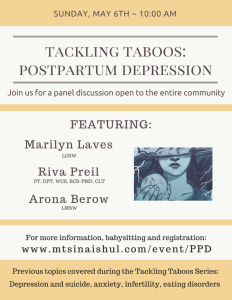
I recently read a fantastic piece in Healthline Newsletter (link to article) about a young woman’s experience with pelvic floor physical therapy. While reading this article, I found myself thinking on several different occasions, “Yes. Yes. YES!” Everything that the author, Allyson Byers, described resonates with the sentiments expressed by my own clients. She hit the head on the nail in her description of the common emotions and fears experienced by pelvic pain patients. I made a mental note to share this extremely validating article with my clients…and what better way to start sharing this gem than with a blog post?
On that note, I would like to address several powerful points that Byers raised:
1. Byers first describes her failed attempts to use tampons as follows: “I tried many more times, but the pain was always so unbearable, so I just stuck to pads.” Using pads by choice is different than using pads due to necessity. This point segues into the next relevant point…
2. After describing her first attempted (and failed) gynecological examination, Byers asks: “How could this much pain be normal? Was there something wrong with me?” Her doctor at the time downplayed her pain and suggested that she try again in several years. With all due respect to this doctor, there WAS something wrong, in fact. Pelvic floor muscle overactivity is an actual physical condition, and young women should be able to tolerate speculum examinations. I have had clients suggest at their initial evaluations, “Perhaps my vagina is just too small for a speculum? Or for intercourse?” I set the record straight and remind them that the vagina is designed for the emergence of a baby, assuming all other relevant factors are present (ex. proper fetal alignment, progression of labor, etc). Regardless, the point remains- if a young woman cannot insert a tampon or tolerate a speculum examination, she is probably an appropriate candidate for pelvic floor physical therapy and should request a prescription from her doctor.
3. Byers goes on to describe how her physical pain affected her interpersonal relationships. “If I went on dates, I’d make sure they ended right after dinner. The worry of physical intimacy led me to breaking off potential relationships.” Unfortunately, I have heard this story too many times. Too many of my clients have shared that relationships have terminated due to their pelvic pain and/or fear of intimacy. Others have admitted that they avoid relationships altogether because it is easier than having to explain their condition to a potential partner. Every person deserves to love and to be loved. Every person deserves the joy of a healthy relationship. I feel blessed to work in a profession that helps foster and promote physical intimacy and interpersonal connection.
4. In addition, Byers states that “doctors told me there was nothing physically wrong, and the pain stemmed from anxiety.” Unbeknownst to her, Byers touched upon one of my personal soapboxes. Pelvic pain usually doesn’t stem from anxiety. It stems from musculoskeletal overactivity and tightness. I am a big believer that our minds can affect our bodies, and psychological stress can have an impact on our physical health. That is why downtraining programs which are initiated to address pelvic floor muscle overactivity often include diaphragmatic breathing, mindfulness based stress reduction, yoga, and other forms of relaxation. However, this is a far cry from “your pain is all in your head” or “this pain must be stemming from anxiety,” which are very discouraging and invalidating comments that no patient with pelvic pain should ever hear. This point leads into my fifth and final article highlight…
5. After her initial evaluation with a competent pelvic floor physical therapist, Byers said, “I felt so hopeful on my way home…I was so happy to know that the pain wasn’t ‘all in my head.’ It was real.” Most clients who visit a pelvic floor physical therapist are completely unaware of the existence of their pelvic floor muscles, let alone understand how they work or how they impact their pain. Most have never seen a model of a pelvis at prior medical visits. Patients are generally extremely appreciative to learn about their bodies and their pain. They are grateful to be validated and to meet someone who understands their condition. They are thankful to finally meet a medical care provider capable of helping them. In addition, knowing the pain’s origin allows clients to feel hopeful about the prospect of healing. It is an honor and privilege to be the harbinger of good news to clients who have been suffering, often for many years.
It probably isn’t easy to describe so openly what pelvic floor physical therapy must feel like from a patient’s perspective. On behalf of the many woman who will hear her story and be inspired to participate in pelvic floor physical therapy, I thank Allyson Byers for courageously sharing her experience.



